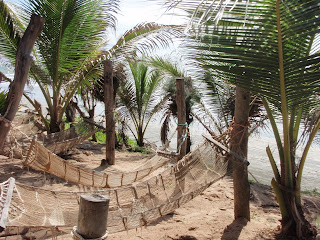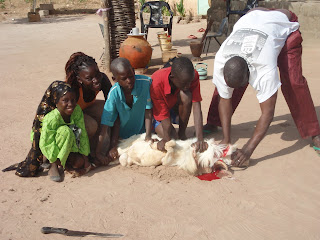


- Sharing food and materials with others.
- Children growing up in a large, extended famiily full of love and support.
- Children having the freedom to actively explore their surroundings, seek adventure and wander round their village knowing they are safe.
- Children playing an important role in the functioning of the family. eg chores.
- Stress free attitude - it will happen when it happens.
- Welcoming family, friends and visitors and feeding/housing them for weeks on end with no fuss.
- Being calm and relaxed when things go wrong eg. broken down bush taxi. No point in complaining if things are beyond your control.
- Greeting people as equals on taxis, gelis, work, on the street regardless of gender, religion, ethnicity or status.
- Honesty between peopl and acceptance of critical feedback.
- Effective and cheap transport system.
- Being able to buy all sorts of items through the window while waiting for a bush taxi to leave. eg. water, bananas, torches, underwear, toothpaste, DVD's, hard bolied eggs, cooked sweet potato.
- Islmamic culture of people praying togther each day, including school children and teachers.
- Half day Fridays due to Friday being a holy day and men go to te mosque.
- Looking out for each other and willingness to pitch in.
- Subsistant farming - eating what you grow.
- Strong focus on family and not things.
- Beautiful sunsets over the water.
- Clear night sky with stars, moon and quiet surroundings.
THE BAD
THE UGLY













